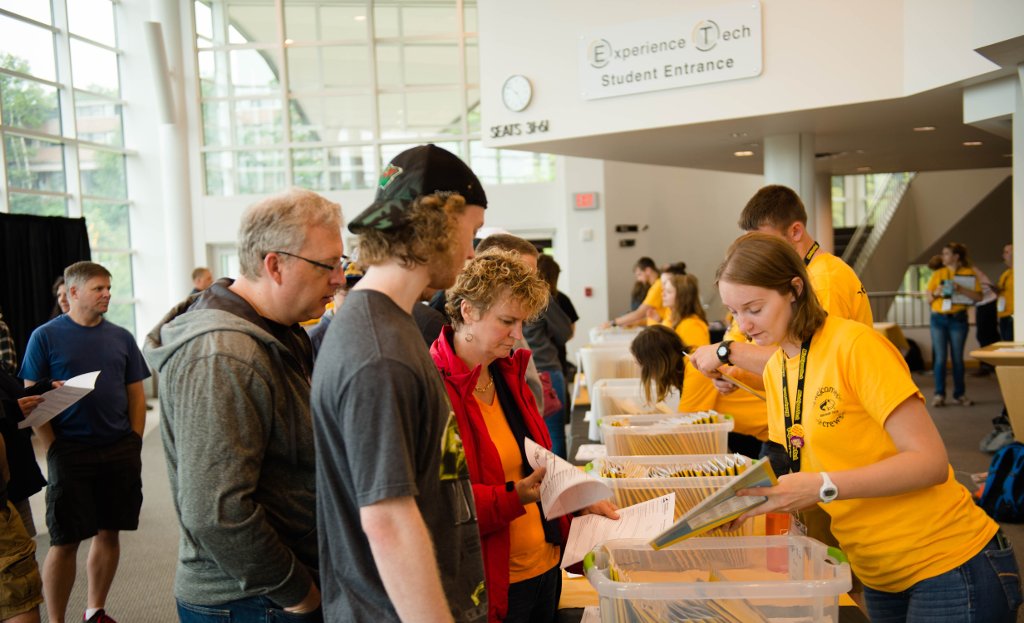Students Take Summer Reading Selection to Heart
Dozens of Michigan Tech students opened their hearts and emptied their wallets Thursday, not for iPhones, concert tickets or even textbooks, but to build schools for the poorest of the poor.
They did it freely and exuberantly, on a spontaneous dare. About 75 hand-picked undergraduates were preparing to mentor 1,400 incoming students arriving for orientation when leadership trainer Paul Wesselmann issued a challenge based on Michigan Tech's Summer Reading selection. They all had read Greg Mortenson's bestseller, "Three Cups of Tea," about his struggle to educate the poor, especially girls, in Pakistan and Afghanistan.
"Mortenson talked about the difficulties of raising money, and I said, ‘It would be so cool if you guys had a basket of money to hand him when he comes to visit,'" said Wesselmann, founder of the Ripples Project in Madison, Wis., which is dedicated to "the extraordinary power of tiny actions." Adding a carrot, Wesselmann promised the students that if they raised $1,000 by 3 p.m., he would match it. It was noon.
"He got us all fired up and pulled this challenge," said senior Nick Puroll, a civil engineering major from Clarkston. "We've been in training 12 and 14 hours a day, and the only time we really had to do this was during the lunch hour. It was intense."
"We had people run over to the Wadsworth dining hall with a bowl," said senior David Walters, a mechanical engineering major from Wixom. "When they found out what we were doing, they opened their wallets." One student after another pulled out 10- and 20-dollar bills. "They said, ‘I don't need this,'" Walters said. "One wrote a check for $300."
It quickly became clear that they would stampede over their $1,000 goal, and the students expanded their fundraising to the University's professional staff. When the dust cleared, they counted their money once, twice, three times and took it to the bank, where they got a cashier's check for $2,915.62.
"I heard so many times from Tech staff that these students are amazing," Wesselmann said later. "What they did was remarkable. I don't know if I could have done it."
Blown away by their effort, he upped his original $1,000 pledge and matched the students' total dollar for dollar, raising the donation to nearly $6,000.
"The Michigan Tech students have basically funded half a school in just a few hours," he said. "That says something to me about Tech students' determination. In their minds, there was never a question that they would do it. And even after we announced that we'd made the goal, students were still giving money."
Even the students were a little surprised. "It's amazing the difference you can make as a small university, compared to Michigan State or the University of Michigan," said sophomore Wesley Grundemann, a chemical engineering major from Albion. "I can't wait to see the look on Greg Mortenson's face when we hand him the money."
Sophomore Haki Kiema, a software engineering major, came to Tech from Nairobi. The 62 cents in the donation is probably her doing, she said, because she gave all the money she had in her wallet, including loose change.
"I've seen the same things in Kenya [that Mortenson addresses in his book], and as one person, sometimes it feels like your efforts are futile," she said. "After reading 'Three Cups of Tea,' I can see one person can make a huge difference.
"It's great to feel you are making a change," she added. "Some girl from Pakistan will be educated, will make a difference in her community, because we helped her out.
"It's a really good feeling."
Michigan Technological University is an R1 public research university founded in 1885 in Houghton, and is home to nearly 7,500 students from more than 60 countries around the world. Consistently ranked among the best universities in the country for return on investment, Michigan's flagship technological university offers more than 185 undergraduate and graduate degree programs in science and technology, engineering, computing, forestry, business, health professions, humanities, mathematics, social sciences, and the arts. The rural campus is situated just miles from Lake Superior in Michigan's Upper Peninsula, offering year-round opportunities for outdoor adventure.




Comments